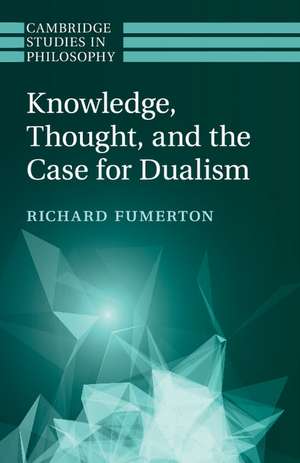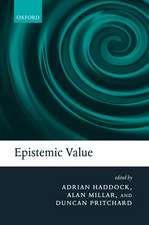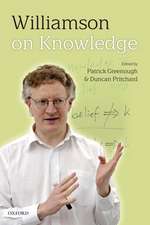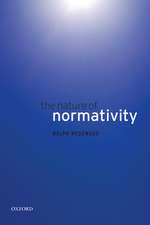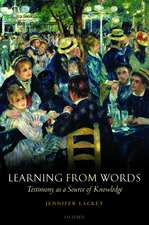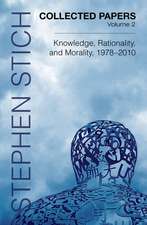Knowledge, Thought, and the Case for Dualism: Cambridge Studies in Philosophy
Autor Richard Fumertonen Limba Engleză Paperback – 30 sep 2015
| Toate formatele și edițiile | Preț | Express |
|---|---|---|
| Paperback (1) | 295.95 lei 6-8 săpt. | |
| Cambridge University Press – 30 sep 2015 | 295.95 lei 6-8 săpt. | |
| Hardback (1) | 693.36 lei 6-8 săpt. | |
| Cambridge University Press – 16 oct 2013 | 693.36 lei 6-8 săpt. |
Din seria Cambridge Studies in Philosophy
-
 Preț: 153.58 lei
Preț: 153.58 lei - 14%
 Preț: 769.32 lei
Preț: 769.32 lei -
 Preț: 225.97 lei
Preț: 225.97 lei -
 Preț: 323.18 lei
Preț: 323.18 lei -
 Preț: 173.58 lei
Preț: 173.58 lei -
 Preț: 433.93 lei
Preț: 433.93 lei -
 Preț: 262.35 lei
Preț: 262.35 lei -
 Preț: 387.37 lei
Preț: 387.37 lei - 11%
 Preț: 688.23 lei
Preț: 688.23 lei -
 Preț: 408.57 lei
Preț: 408.57 lei - 11%
 Preț: 445.99 lei
Preț: 445.99 lei - 11%
 Preț: 577.02 lei
Preț: 577.02 lei - 11%
 Preț: 423.03 lei
Preț: 423.03 lei -
 Preț: 273.50 lei
Preț: 273.50 lei - 11%
 Preț: 427.52 lei
Preț: 427.52 lei -
 Preț: 449.76 lei
Preț: 449.76 lei -
 Preț: 223.67 lei
Preț: 223.67 lei - 11%
 Preț: 691.14 lei
Preț: 691.14 lei - 14%
 Preț: 675.49 lei
Preț: 675.49 lei - 14%
 Preț: 696.12 lei
Preț: 696.12 lei -
 Preț: 239.48 lei
Preț: 239.48 lei -
 Preț: 319.40 lei
Preț: 319.40 lei -
 Preț: 378.11 lei
Preț: 378.11 lei - 14%
 Preț: 863.75 lei
Preț: 863.75 lei - 11%
 Preț: 691.81 lei
Preț: 691.81 lei -
 Preț: 433.93 lei
Preț: 433.93 lei - 11%
 Preț: 456.26 lei
Preț: 456.26 lei - 11%
 Preț: 611.45 lei
Preț: 611.45 lei - 11%
 Preț: 688.23 lei
Preț: 688.23 lei -
 Preț: 313.85 lei
Preț: 313.85 lei -
 Preț: 220.42 lei
Preț: 220.42 lei - 11%
 Preț: 687.59 lei
Preț: 687.59 lei -
 Preț: 209.44 lei
Preț: 209.44 lei -
 Preț: 284.89 lei
Preț: 284.89 lei -
 Preț: 281.12 lei
Preț: 281.12 lei - 11%
 Preț: 692.50 lei
Preț: 692.50 lei -
 Preț: 291.93 lei
Preț: 291.93 lei - 14%
 Preț: 740.63 lei
Preț: 740.63 lei - 11%
 Preț: 687.02 lei
Preț: 687.02 lei - 11%
 Preț: 525.56 lei
Preț: 525.56 lei - 11%
 Preț: 693.18 lei
Preț: 693.18 lei - 11%
 Preț: 688.92 lei
Preț: 688.92 lei - 11%
 Preț: 686.42 lei
Preț: 686.42 lei - 11%
 Preț: 693.78 lei
Preț: 693.78 lei - 11%
 Preț: 583.02 lei
Preț: 583.02 lei - 11%
 Preț: 686.53 lei
Preț: 686.53 lei -
 Preț: 394.57 lei
Preț: 394.57 lei
Preț: 295.95 lei
Nou
Puncte Express: 444
Preț estimativ în valută:
56.63€ • 60.56$ • 47.22£
56.63€ • 60.56$ • 47.22£
Carte tipărită la comandă
Livrare economică 17 aprilie-01 mai
Preluare comenzi: 021 569.72.76
Specificații
ISBN-13: 9781107559257
ISBN-10: 1107559251
Pagini: 300
Dimensiuni: 140 x 227 x 15 mm
Greutate: 0.35 kg
Editura: Cambridge University Press
Colecția Cambridge University Press
Seria Cambridge Studies in Philosophy
Locul publicării:New York, United States
ISBN-10: 1107559251
Pagini: 300
Dimensiuni: 140 x 227 x 15 mm
Greutate: 0.35 kg
Editura: Cambridge University Press
Colecția Cambridge University Press
Seria Cambridge Studies in Philosophy
Locul publicării:New York, United States
Cuprins
Preface; 1. Setting the stage; 2. Distinctions - versions of physicalism and dualism; 3. Ontological priorities - taking phenomenology seriously; 4. Knowledge arguments revisited; 5. Indirect thought and informative identity; 6. An ontologically liberating skepticism - the last hope for physicalism; 7. Objections and replies; 8. The ubiquitous self - a brief postscript.
Notă biografică
Descriere
This book offers a new rehabilitation of the knowledge argument for dualism, demonstrating its interconnection with philosophy of mind.
